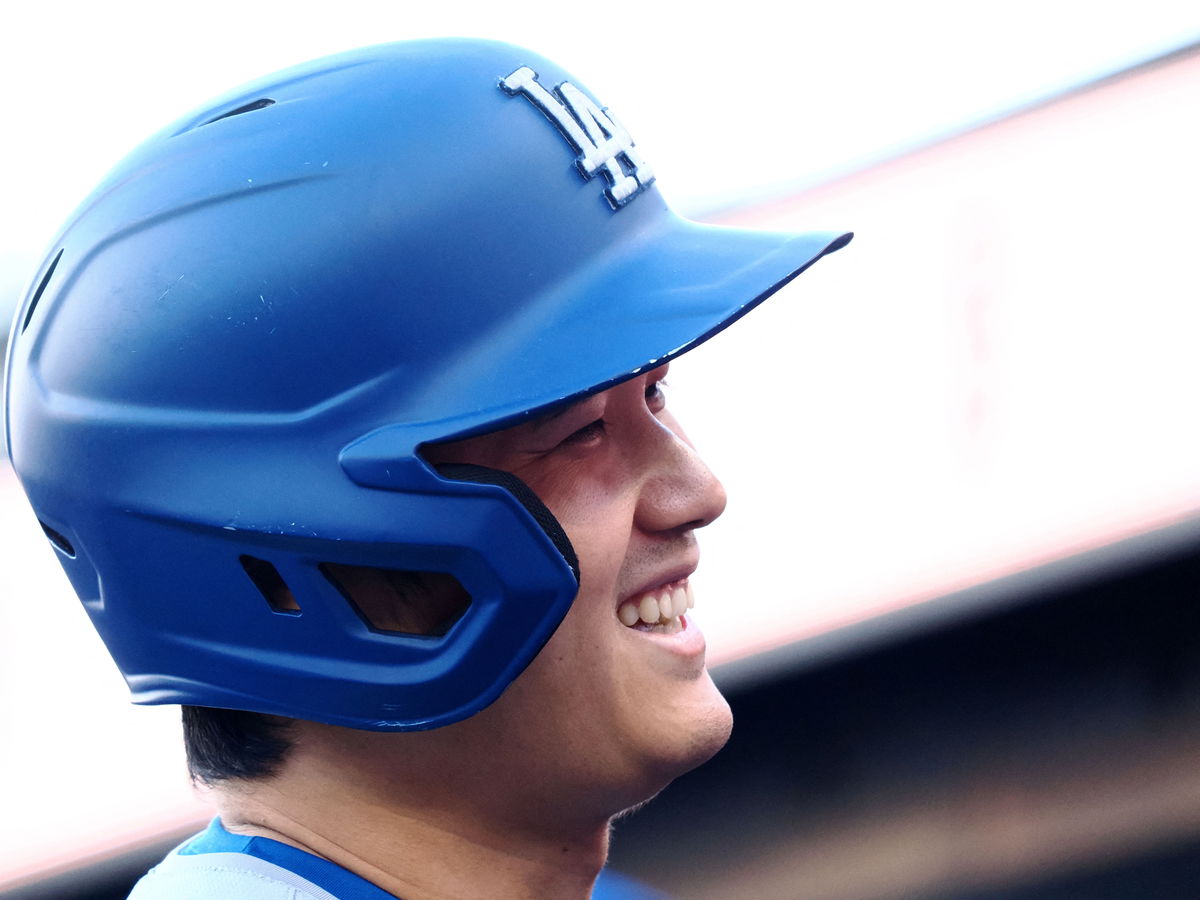
USA Today via Reuters
Jun 28, 2024; San Francisco, California, USA; Los Angeles Dodgers designated hitter Shohei Ohtani (17) in the dugout before a game against the San Francisco Giants at Oracle Park. Mandatory Credit: Kelley L Cox-USA TODAY Sports

USA Today via Reuters
Jun 28, 2024; San Francisco, California, USA; Los Angeles Dodgers designated hitter Shohei Ohtani (17) in the dugout before a game against the San Francisco Giants at Oracle Park. Mandatory Credit: Kelley L Cox-USA TODAY Sports
Shohei Ohtani, the Los Angeles Dodgers’ two-way phenom, is rewriting MLB’s rulebooks with his awe-inspiring 2024 season. Leading the league in several offensive categories, Shotime’s MVP candidacy is undeniable. However, ESPN analyst Michael Wilbon’s recent on-air declaration stating that he wouldn’t vote for a Designated Hitter for MVP has ignited a firestorm of debate. “I wouldn’t do it… so ill-advised,” Wilbon boldly proclaimed, arguing, “You can’t play half the game and be MVP.”
Watch What’s Trending Now!
This statement has opened Pandora’s box of questions about the value of DHs in modern baseball and the historical bias against them in MVP voting. Where does this animosity root from, one might ask?
The Designated Hitter position, introduced in 1973, has always been a polarizing topic in baseball. Traditionalists argue that DHs, who primarily contribute offensively, lack the all-around value of players who also excel defensively. This sentiment is reflected in the history of MVP voting, where no primary DH has ever won the award.
ADVERTISEMENT
Even the legendary Edgar Martinez—a perennial All-Star and Silver Slugger—never received the honor, despite his impressive offensive numbers. This historical context sets the stage for the current debate surrounding Ohtani’s MVP candidacy.
“Listen, as great as Shohei is—and he’s great—I’m not voting for a DH to win MVP,” Wilbon asserted in ESPN’s Pardon The Interruption, echoing the traditionalist view that DHs are inherently less valuable than two-way players—“If Shohei wins the triple crown and he could, I’d vote for him.” Wilbon’s co-host, Frank Isola, countered with a compelling argument: “If Dennis Eckersley could be an MVP as a reliever, Shohei Ohtani could be an MVP as a DH, come on!”
This encapsulates the ongoing debate about the evolving role in modern baseball. Wilbon’s comments are bound to draw sharp criticism from fans, analysts, and former players alike.
ADVERTISEMENT
Yes. Many may argue that Ohtani’s offensive prowess transcends the DH label. It points to his league-leading statistics and undeniable impact on the Dodgers. “It would be historic also if he does it,” Isola passionately said and highlighted the potential significance of Shotime’s MVP win. His hope stems from the fact that while no primary DH has won the regular-season MVP, several players have achieved the feat while splitting their time between DH and fielding positions—and that potential holds more than just some substance inside it.
ADVERTISEMENT
Shohei Ohtani’s unique value proposition—the two-way threat following the steps of historical precedents set by part-time DHs and World Series MVPs
Jim Rice, Don Baylor, and Juan Gonzalez. All these legendary players have one thing in common: they have all secured MVP awards in seasons where they played a significant number of games as DHs. Moreover, these three DHs have previously been named World Series MVP: Paul Molitor, Hideki Matsui, and David Ortiz. This historical precedent demonstrates that this role can indeed possess the most valuable players on their teams, even in the most crucial moments. But this current era might just be a new one for DHs.
The criteria for MVP voting have evolved, with increasing emphasis on advanced statistics like WAR. That helps quantify a player’s overall contribution to their team. This shift could favor DHs like Shohei Ohtani, whose offensive value is readily quantifiable.
Top Stories
Blue Jays Confirmed to Land MLB’s “Big Fish” After Mark Shapiro Fires Bold Message to Clubhouse, per Insider

Rift in Phillies Clubhouse as Dave Dombrowski Punishes Bryce Harper Teammate in “Worst Trade” Fallout, Says Insider

Why Bo Bichette Should Not Change His Position to 2B Amid Deepening Red Sox Rumors

MLB Signings: 5 Teams That Must Sign Kyle Tucker, Bo Bichette & Alex Bregman

Mark Shapiro Rubs Salt in Yankees’ Wounds as He Issues Stark Ultimatum to Blue Jays Clubhouse

As baseball continues to embrace the DH in both leagues, voter perceptions may also shift, leading to greater acceptance of DH candidates for the MVP award. The Unicorn’s 2024 season has been nothing short of a masterclass in offensive dominance. With a league-leading OPS+ of 194, 25 home runs, and 201 total bases—ranking second in hits (101) and stolen bases (16), Ohtani’s impact is undeniable. His exceptional performance has undoubtedly propelled the Dodgers and captivated fans worldwide.
ADVERTISEMENT
Shotime’s WAR (Wins Above Replacement) of 4.7 is among the highest, further solidifying his claim to the MVP throne. Yet, amidst the excitement surrounding a historic season, Wilbon’s comments on ESPN have sent shockwaves through the baseball world.
While Shotime is primarily a DH this season because of the TJ surgery he had to cope with a previous injury, his past performance as a pitcher adamantly underscores his extraordinary value as a two-way player. Even as a pure hitter, Ohtani’s ability to impact the game in multiple ways sets him apart. His rare combination of power, speed, and on-base skills makes him a truly unique and valuable asset.
The controversy surrounding his MVP candidacy highlights the ongoing tension between traditional and modern approaches to baseball. As the game continues to evolve, the role of the DH is likely to become even more prominent.
ADVERTISEMENT
The outcome of this year’s vote could significantly influence how DHs are perceived and evaluated in the future. Will the community finally embrace the idea of a DH—possibly Shohei Ohtani—as the most valuable player?
Only time will tell.
ADVERTISEMENT
ADVERTISEMENT
ADVERTISEMENT

